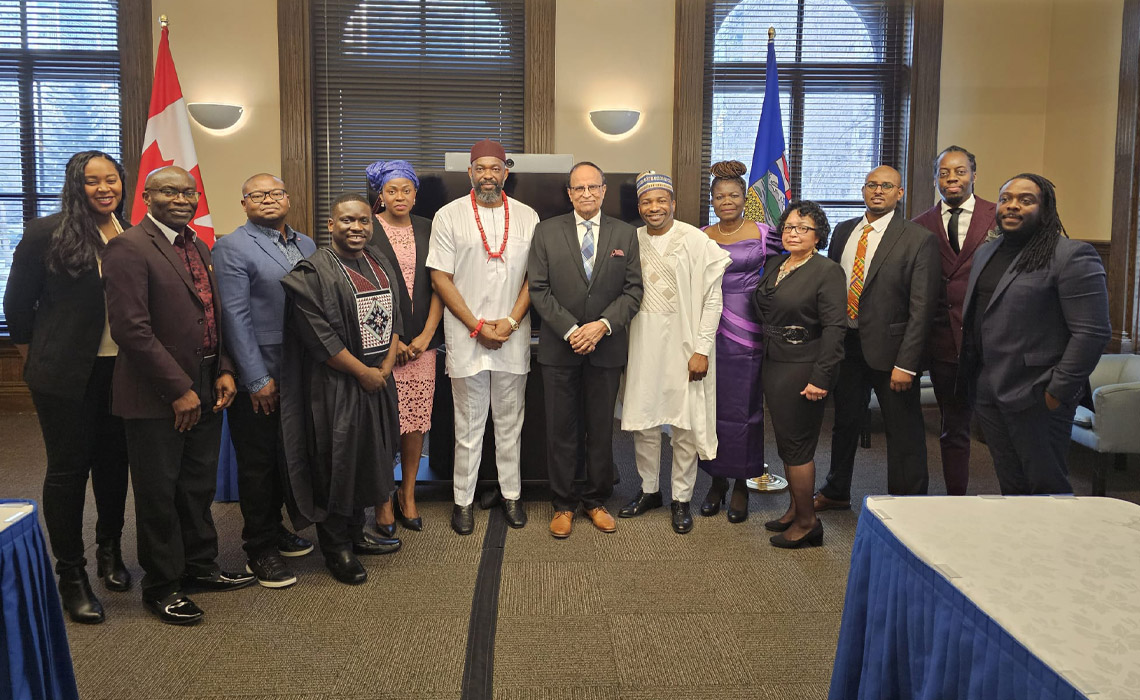Provincial Black Advisory Council formed

Mount Royal professor Faith-Michael Uzoka, PhD, has been appointed to the newly inaugurated 11-member Alberta Black Advisory Council, which is composed of individuals from diverse backgrounds representing a wide range of perspectives, professions, ages, genders, regions and languages.
"I would like to congratulate Dr. Faith-Michael Uzoka for his nomination to the Alberta Black Advisory Panel. I know how important it is to have a post-secondary voice amongst the midst, and Dr. Uzoka will provide an educated, passionate and balanced social inclusion and belonging perspective for all Albertans, and Black Albertans in particular,” said Dr. Moussa Magassa, PhD, Mount Royal’s associate vice-president, equity, diversity and inclusion.
The council will advise Alberta’s Minister of Immigration and Multiculturalism on policies and programs aimed at eliminating systemic barriers, and promote the flourishing of Black communities.
"Alberta’s Black Advisory Council will provide important insight and advice into how the government can better support Black Albertans. This new council will be advising on how to increase opportunities for Albertans in these communities to prosper as vital contributors to the growth of the province’s culture and economy,” said Muhammad Yaseen, minister of Immigration and Multiculturalism, at the Council's inauguration ceremony on Feb. 20.

Census data from 2021 indicates that 4.2 per cent of the Canadian population (1,547,870) and 4.2 per cent of Albertans (177,940) reported they are Black visible minority. According to a Canadian Centre for Justice and Community Safety Statistics publication titled Experiences of discrimination among the Black and Indigenous populations in Canada, 2019, almost half (46 per cent) of Black people aged 15 and older reported experiencing at least one form of discrimination in the past five years.
Uzoka, a Department of Mathematics and Computing faculty member, also acts as MRU’s special advisor on equity, diversity and inclusive excellence for the 2023/2024 academic year. He recently took the time to respond to a few questions on how the development of the Council and his presence on it may end up improving the lives of Black Albertans, and all Albertans.
What led you to apply to be on the Council?
My interest in the Alberta Black Advisory Council stems from my longstanding commitment to advocating for equity and inclusion for historically marginalized groups in our society. As the president of Canada’s African Coalition Club, I have actively worked to advocate at the governance level for policies and programs aimed at eliminating systemic barriers and advancing Black inclusion and flourishing in Alberta. Through my leadership role, I have gained first-hand experience in navigating complex systems and engaging with stakeholders to drive meaningful change.
Given this background, I recognize the Alberta Black Advisory Council as a significant opportunity and platform to leverage my expertise and lived experience to advocate for concrete policy and program changes that address the systemic challenges faced by Black communities in Canada, with a specific focus on Alberta. I am confident that my knowledge and skill set, combined with my passion for social justice, will enable me to contribute effectively to the Council's efforts in advising the Government of Alberta on inclusive policies and programs that will uplift Black Albertans and foster their full participation in our province's social, economic and cultural life.
What do you see are the primary needs (or issues or concerns) of Black Alberta communities?
The primary needs of Black Alberta communities are deeply rooted in addressing the historical injustices and systemic inequities that have disproportionately affected Black Canadians and Black Albertans. These communities face pervasive barriers that hinder their equitable access to opportunities across various sectors, including education, employment, business, health care and justice.
Acknowledging the historical challenges faced by Black Canadians and their significant contributions to the development of Canada, it is imperative to redress these disparities. Centuries of systemic discrimination and marginalization have placed Black Albertans at the highest level of disadvantage in society, perpetuating cycles of poverty, exclusion and limited opportunities for advancement.
To address these pressing needs, there is an urgent call for fostering a sense of belonging and inclusion within Black communities, combating pervasive discrimination and racism and promoting cultural representation and celebration within the province. It is essential to implement targeted policies and initiatives that dismantle systemic barriers, provide equitable access to resources and opportunities and ensure that Black Albertans can fully participate in and contribute to the social, economic, and cultural fabric of our province.
What is a particular opportunity you see that is available now for improving the lives of Black Albertans?
One particular opportunity for improving the lives of Black Albertans lies in the increasing awareness and commitment towards equity, diversity, and inclusion (EDI) efforts, especially amid the ongoing societal shift towards recognizing and rectifying historical injustices. As people become more cognizant of the importance of EDI, there is a growing momentum to address systemic inequalities and promote a more inclusive society.
This presents a timely opportunity for policy reforms and initiatives aimed at uplifting Black communities and dismantling barriers to their advancement. With the commitment of the Government of Alberta to ensuring that all Albertans are part of the Alberta Advantage, there is a conducive environment for implementing impactful policies and programs. By leveraging this commitment, we can create pathways to success for Black Albertans, ensuring equitable access to education, employment, health care, business opportunities and justice.
By seizing this moment, we can work towards creating a more just and inclusive society where every individual, regardless of their background, can thrive and contribute meaningfully to the prosperity of our province.
When everyone feels valued, what happens?
When everyone feels valued, it fosters a sense of belonging, dignity, and empowerment within communities. This leads to increased collaboration, innovation and productivity, as individuals are more motivated to contribute their unique perspectives and talents towards collective goals. Furthermore, valuing each member of society cultivates a culture of respect, empathy and solidarity, laying the foundation for a more equitable and harmonious society where everyone can thrive and fulfill their potential.

